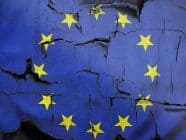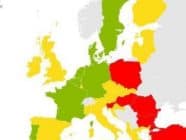*Article courtesy of the European Journalism Centre
 On a Tuesday morning in Rome, a woman drinks her espresso while browsing the European Daily in a noisy cafeteria.
On a Tuesday morning in Rome, a woman drinks her espresso while browsing the European Daily in a noisy cafeteria.
At the same time in Stockholm, an Erasmus student from Bulgaria is absorbed in a report from the same paper about his country finally being accepted into the Schengen area. Although just a scenario right now, these scenes could soon become reality with the expected launch of the European Daily newspaper in early autumn.
“Europe’s daily newspaper will give open-minded Europeans a reliable, authoritative source for quality news and analysis in English from a European perspective,” says Johan Malmsten, one of the three young founders of the newspaper. Hold on a second, a new daily newspaper in 2012? Who wants to launch a newspaper at a time when advertising revenues are increasingly migrating online and print journalists need to learn multimedia skills to keep their jobs? At a time when media analysts are predicting the death of print media?
“We are a publication that partly targets a more senior audience who, to a great extent, still prefers print, as well as a traveling audience who wants to read their news on a flight or at their hotel,” says Malmsten. Malmsten and his partners say they are prepared for the troubled waters of the print industry. On the long term, they are relying on a mix of print and online to create a sustainable revenue stream. Since they intend to keep the newspaper independent, they are now working hard to find financing partners for their new venture.
A Pan-European Newspaper
The idea for the European Daily was born in Paris in 2007, when Malmsten and Christofer Berg, two Swedes studying and working in the French capital, felt the need for a media outlet that would speak about the daily reality of Europeans living in another country than their own on the European continent. Malmsten is a young entrepreneur who studied international business at Harvard University and organisational behaviour at the London School of Economics. His partner, Berg, graduated from the University of Cambridge and is now a parliamentary assistant at the European Parliament in Brussels. The two Swedes are running the European Daily project together with a third entrepreneur, Daniel Freund from Germany. While Malmsten and Freund mainly focus on operational aspects of the newspaper, Berg is primarily responsible for the editorial content.
They are supported by a group of advisors and part of the future editorial staff of the newspaper. A team of volunteers updates the newspaper’s website. Malmsten explains that the European Daily team will consist of about 30 people from the start, about half of whom will work on the content. “Most editorial positions will be filled by very senior professionals with experience from major international or national dailies. They will be complemented by a number of younger stars. We are putting a lot of effort into setting up a diverse team, in terms of age, nationality and gender, although we are of course a bit constrained by our language requirement. They need to have an excellent level of English.”
“Some people have praised us on our perfect timing, given the vivid current debate about Europe and the fact that a European news source and a common public sphere have never been as much in demand. At the same time, others tell us it is bold to launch a European paper these days, asking: ‘What if Europe falls apart?’”
The young entrepreneur makes it clear that the starting point for the European Daily is not the European Union, but the pragmatic aspects of a Europe where people are crossing borders for study, work, and leisure more than ever before. Personal and professional networks go beyond countries and nationalities. “Europe is a daily reality for millions of Europeans and that won’t change. We see giving these people a news source and a daily point of reference as our mission, and 2012 is one year better than 2013,” says Malmsten.
A Successful Preview Edition
In the summer of 2011, the European Daily printed 40,000 copies of a preview edition to present the vision of the newspaper to future readers. The copies were distributed mainly in Berlin, Brussels, London and Paris. The response to the preview edition was overwhelmingly positive, according to the paper’s founders, who admit they were originally slightly worried about the reception of a European branded English newspaper title in non EU-member states such as Switzerland and Norway, or in Euro-sceptic countries such as the United Kingdom.
But the preview edition brought them a surprising discovery in that respect. “What we found is that these polarised markets provide an opportunity rather than a challenge. It seems, for example, that many Norwegians feel disconnected from the rest of Europe and for them a title like the European Daily can symbolise a certain belonging. The Norwegian retail distributor was the first one to get in touch with us after the publication of the preview edition,” Malmsten recalls. The editorial team of the European Daily will be based in Amsterdam, the Netherlands. The city was chosen for a series of practical and political reasons. “Amsterdam is well connected to the rest of Europe and the city is an attractive place for future staff to relocate to,” says Malmsten.
“On the symbolic side, we did not want to be in Brussels since what we are producing is a European, and not a EU, newspaper. Being based in Brussels would risk sending off the wrong signals in this regard and we would also run the risk of being drawn into the pretty isolated life of the ‘Brussels bubble’ which would give us a disproportionate focus on the EU institutions. Other big capitals with big political machines carry similar risks, so we ruled out London, Paris, Berlin,” Malmsten explains.
Although the feedback from the European Union institutions has been positive, the European Daily does not receive any European funding since its founders want it to be an independent, commercially driven venture. The European Daily team will promote the newspaper at press kiosks around Europe by touring the big cities and handing out 50,000 copies for one or two days after the launch of the newspaper.
It will have a general news coverage, including politics, business, culture, and sport. The style, tone and length of articles will be similar to the preview edition, but the founders wouldn’t reveal more for now.
It will use a Berliner print format and digital editions will be available for the most common types of tablets and smartphones. The newspaper will be sold in large metropolitan areas for €2.50 per copy. European travellers might also find it on planes, trains or at their hotels.
The Erasmus Generation as “Natural Readers”
The team behind the European Daily believes that young people who have taken part in an Erasmus student exchange programme will find the newspaper appealing. “The European Daily is not for everyone, but there is definitely a large target audience out there,” argues Malmsten. “The ‘Erasmus generation’ are our natural readers. So are the many millions of people living in a European country other than their own, as well as those crossing borders for work or leisure”, he explains.
To those who are used to reading the European section of the Financial Times or the International Herald Tribune for information on the old continent, the European Daily will bring a European perspective on issues and events. “For a Dane living in Paris, an important news story in Poland might well be more important than the municipal elections in France. So part of the European perspective will consist in selecting the most important news from across Europe. The other part is covering these news items in a way so that people can relate to them, by applying a European perspective to the story itself. This means asking how does this story matter to our reader as a citizen of Europe?” Malmsten says.
He promises that the European Daily will be an exciting platform for debate in Europe. “Today, if Angela Merkel writes an op-ed, it is translated and published in several national newspapers and quickly segments into parallel, national debates because no one can respond to her piece directly,” he explains. The purpose of his newspaper, he says, is to provide common points of reference for European readers, whether they are looking for the latest news, insightful analyses or thought-provoking opinions.
“Over time, we of course hope that we can help to shape some sort of European public sphere, which is pretty much nonexistent to date,” he adds. In the future, Malmsten also hopes to create a European public sphere, a topic often discussed yet still non existent. The European perspective will be a challenge in itself for the newspaper, since the editorial team will have to cater to readers with different needs and realities but the same expectations for high-quality journalism. “Our editorial staff has to be capable of seeing the wider horizon and picking out the stories that matter. Added to that is the European perspective we strive for, which will sometimes involve additional research, country comparisons, and so on,” Malmsten says.
While the European crisis is experienced as a never-ending dark period for many entrepreneurs, it seems to have given Johan Malmsten and his business partners the perfect time to launch a newspaper for a European audience. Never before staying closer together or falling apart as an union has been more discussed than in the past few years. “Regardless the state of the EU, more people than ever are moving across borders, making careers and friends all across Europe, and that trend is only growing stronger – which is why the launch of the European Daily is quite timely,” says a convinced Malmsten.
Original article, written by Carmen Paun, can be found at the European Journalism Centre.
Tags: Christofer Berg, Daniel Freund, Erasmus, Erasmus Generation, European Daily Newspaper, European Journalism Centre, European Union, Johan Malmsten, print media












































